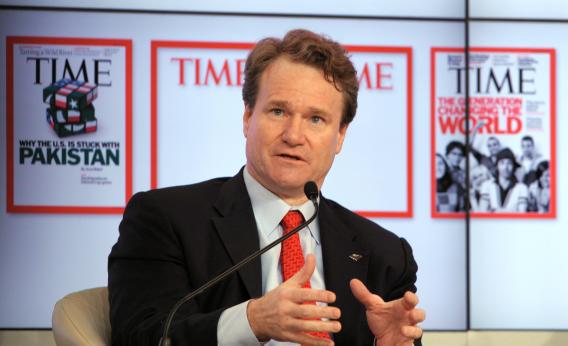A completely preposterous Politico article interviews a few CEOs, discovers that American CEOs favor the exact same pro-CEO agenda they’ve been pushing for years on CNBC and the Wall Street Journal editorial page, and then proclaims that this is all a genius new strategy to produce an economic boom. New York-based financial reporters seem to me to frequently misunderstand congressional proclamations, and by the same token D.C.-based political reporters are all-too-credulous when CEOs show up in person to do their own lobbying.
But that’s all trivial. What actually angers me is the eternal recurrence of CEO demands for tax cuts phrased as demands for certainty:
Bank of America CEO Brian Moynihan said long-term commitments to measures such as tax reform and trade would provide a “certainty premium” that would help bring corporate cash off the sidelines. “If we can just allow people to keep their confidence up by getting some of these issues off the table,” he said, “you would see the economy grow and momentum continue to build, and unemployment continue to ease down, and housing starts [go] up and housing prices [go] up. All that will continue to build on itself.”
Look. Uncertainty is an intrinsic feature of reality. Business executives do not currently know what fiscal or regulatory policy will look like in 2017 and there is absolutely nothing that can be done to alter this fact. Executives in 1952 did not know what 1957 would look like and executives in 1992 did not know what 1997 would look like. As you probably recall from Back to the Future Part II, it is in fact the case that perfect foreknowledge of future events would make it trivially easy to become rich. But that’s a science fictional premise. To get technical about it, even perfect foreknowledge of the probability distribution of future events would suffice with some number crunching. But in the real world it’s hard to get rich because certainty doesn’t exist. There’s no certainty about domestic public policy, there’s no certainty about foreign crises, there’s no certainty about technologic trends, there’s no certainty about consumer tastes, there’s no certainty about anything. Life is hard.
But Google’s managed to build a lucrative business around web search and advertising without certainty. Apple and Samsung have built lucrative smartphone businesses without certainty. They pay the CEOs the big bucks because it’s hard to know how to make successful products in an uncertain world. That’s the job.
